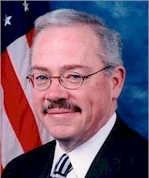
Rep. Barr Loses Primary Election
August 20, 2002. Rep. John Linder (R-GA) defeated Rep. Bob Barr (R-GA) in the Republican primary election for the Georgia 7th Congressional District. The two incumbents faced each other as a result of redistricting.
Rep. Barr has been active on a wide range of technology related issues, particularly matters pertaining to electronic privacy and Internet taxation. As a member of the House Judiciary Committee, and Chairman of its Subcommittee on Commercial and Administrative Law, he has been in a position to pursue his technology related agenda.
 |
|
| Rep. Barr | |
Electronic Privacy. Rep. Barr has been active in various debates regarding privacy. There are two distinct types of privacy rights. First, there are the privacy rights of individual consumers, patients, and web surfers as against the corporations and other private sector entities that collect data about them. Second, there are the rights of individuals as against the government entities that monitor, investigate, and prosecute them. Generally, Republicans and conservatives who take an interest in protecting privacy see government as the larger threat. Rep. Barr and Rep. Dick Armey (R-TX) have been among the most vocal members of this group. (Rep. Armey is also retiring.) In contrast, Democrats and liberals who take an interest in privacy tend to see businesses as the greater threat.
Rep. Barr gave a speech in April 1999 in which he discussed the National Security Agency's (NSA) signals intelligence activities, the FDIC's proposed "know your customer" regulations, the proposed national ID card, and roving wiretaps by law enforcement. See, TLJ story titled "Rep. Barr Encourages Privacy Advocates to Deluge Congress", April 6, 1999.
In late 2000, during the 106th Congress, Rep. Barr was active in the debate over HR 5108, the Electronic Communications Privacy Act of 2000. Rep. Barr offered an amendment that was approved by the Constitution Subcommittee that would have prohibited the government from using cell phones as tracking devices without probable cause. During full committee debate he argued for a bill that protects privacy, rather than increases law enforcement power. In the end, the Judiciary Committee did not approve the bill, and it lapsed at the end of the 106th Congress. See, TLJ story titled "House Committee Delays Adoption of Electronic Communications Privacy Act", September 22, 2000.
Rep. Barr is also the sponsor of HR 4561, the "Federal Agency Protection of Privacy Act". This bill would require federal agencies to include a privacy impact analysis with proposed regulations that are circulated for public notice and comment. See, story titled "House Subcommittee Holds Hearing on Federal Agency Privacy" in TLJ Daily E-Mail Alert No. 423, May 2, 2002.
Rep. Barr also worked to limit law enforcement surveillance powers contained in early versions of the PATRIOT Act, passed in late 2001.
Internet Taxation. Rep. Barr has also been a leading opponent of taxing the Internet. As Chairman of the Subcommittee on Commercial and Administrative Law, he shepherded HR 1552, the Internet Tax Nondiscrimination Act, through his Subcommittee, and the full Judiciary Committee. The bill extended the temporary moratorium on multiple or discriminatory Internet taxes, and taxes on Internet access. See, story titled "Subcommittee Approves 5 Year Extension of Internet Tax Freedom Act", in TLJ Daily E-Mail Alert No. 241, August 3, 2001. The full Committee and House ultimately approved a shorter extension than that backed by Rep. Barr. See, story titled "House Committee Votes 2 Year Extension of Net Tax Moratorium", TLJ Daily E-Mail Alert No. 284, October 11, 2001.
Rep. Barr has also supported HR 2526, the Internet Tax Fairness Act of 2001. The bill would limit the imposition of business activity taxes (BATs) on electronic and other interstate commerce by state and local taxing authorities. See, story titled "House Subcommittee Approves Bill to Limit Business Activity Taxes", in TLJ Daily E-Mail Alert No. 471, July 17, 2002.
During debate in the Subcommittee on Commercial and Administrative Law over HR 1410, the Internet Tax Moratorium and Equity Act, sponsored by Rep. Ernest Istook (R-OK), Rep. Barr raised privacy issues. The bill would have provided that state and local taxing authorities may require out of jurisdiction Internet sellers (and other remote sellers) to collect sales taxes. The U.S. Supreme Court ruled in Quill v. North Dakota, 504 U.S. 298 (1992) that state and local taxing authorities are barred under the Commerce Clause from requiring remote sellers without a substantial nexus to the taxing jurisdiction to collect sales taxes for sales to persons within the jurisdiction. However, the Court added that Congress may extend such authority. HR 1410 would provide such taxing authority. Rep. Barr argued that under the proposed legislation, retailers would need to collect data, including individuals' names, addresses, items purchased, and locations of purchases.